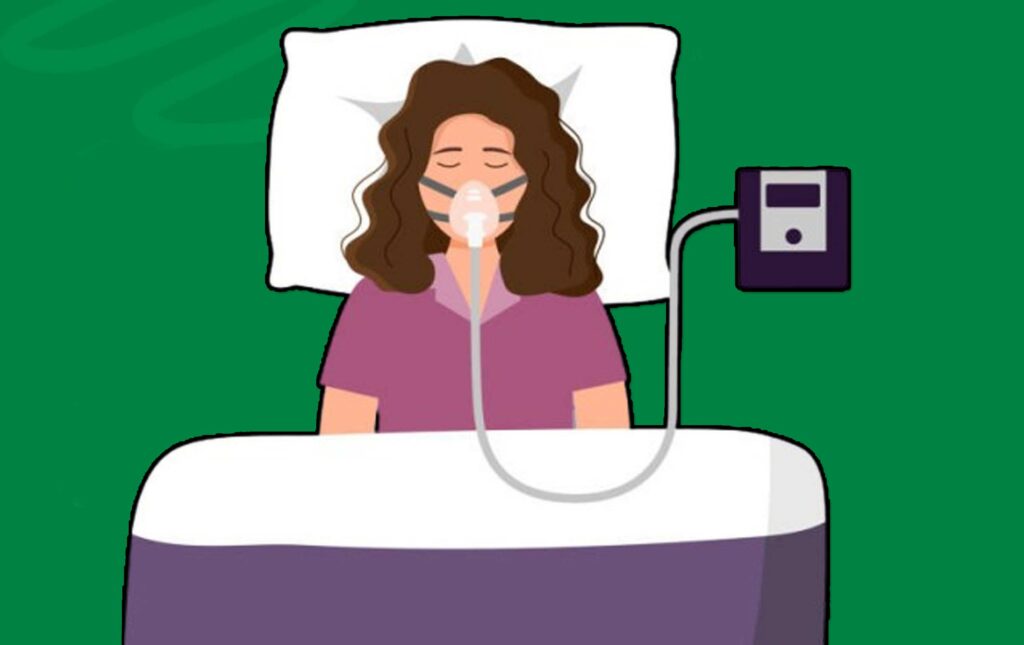Does my insurance provider cover CPAP machines? Have you recently been diagnosed with obstructive sleep apnea? A Continuous Positive Airway Pressure (CPAP) machine might be just what you need for improved sleep. While CPAP machines are often highly effective, they can also come with a significant price tag.

And because of how expensive CPAP therapy is, it is normal to wonder if your insurance providers will help to cover it. In this article, we will cover most of the insurance information surrounding continuous positive airway pressure machines. Read on to the end to know more about If Insurance Cover CPAP Machines.
What are CPAP Machines?
CPAP machine therapy is a very popular treatment for obstructive sleep apnea (OSA), where an individual breathing stops and starts repeatedly during sleep because of blocked or narrowed airways. These machines are often the first choice for treating obstructive sleep apnea because they are proven to be effective.
Continuous positive airway pressure machines work by blowing pressurized air into the upper airway, preventing it from collapsing and causing breathing pauses.
Usually, a CPAP machine includes:
- A motor that helps to pressurize the air
- A mask that can help to cover the nose or both the nose and mouth of the individual (some use nasal prongs that fit inside the nose or a tube that goes through the nose to the top of the throat)
- Straps that helps to keep the mask in place
- A tube connecting the mask to the motor.
Also, some machines have a heated humidifier to make them more comfortable; especially for individuals that has dry nasal passages or skin.
Will My Insurance Cover CPAP Machines?
Most health insurance plans do cover part of the cost of CPAP machines and related supplies. Although, the machines are usually partially covered, you might need to pay for items like tubing. Keep in mind that things like Replacement parts may also be covered, but there could be limits on how much reimbursement you can get each year. In many cases, insurance companies require you to meet your annual deductible before they begin covering the cost of CPAP equipment.
They also assess your eligibility for CPAP coverage based on your Apnea-Hypopnea Index (AHI), which indicates how many times per hour you stop or nearly stop breathing during sleep. To determine your AHI, you’ll need to undergo a sleep study either in a sleep lab or from the comfort of your home.
Sleep apnea can be mild (AHI 5-15), moderate (AHI 15-30), or severe (AHI over 30). Generally speaking, Medicare and Medicaid cover CPAP machines for all levels if you meet the insurer’s certain criteria. Other insurers might have different rules, so check your policy for details about the coverage.
CPAP Machines Requirements
Before most insurance providers will help to cover your CPAP equipment, you need to meet two specific requirements. First, you need a prescription for CPAP therapy from your personal healthcare doctor. Second, you must successfully complete a compliance period with the CPAP machine to demonstrate that you are effectively using the treatment.
To get a prescription, your healthcare doctor must confirm that your sleep issues are due to sleep apnea and not another type of condition. They will look for symptoms of obstructive sleep apnea, such as:
- Loud snoring
- Gasping or snorting while sleeping
- Excessive daytime sleepiness
- Forgetfulness
- Headaches
- Drowsiness or falling asleep when you are driving.
If these symptoms suggest sleep apnea, you’ll need to take a sleep study. And just as I have mentioned above, this can easily be done overnight in a lab (polysomnography) or at home. After reviewing the sleep study results, your healthcare provider might diagnose you with sleep apnea and develop a treatment plan.
To get reimbursement, the Centers for Medicaid and Medicare (CMS) require that you submit proof that you make use of the CPAP machine at least 4 hours per night, on seventy percent of nights, in a consecutive 30-day period. Most machines track your usage automatically. Some connect to a phone app and transmit data, while others make use of an SD card.
If you don’t meet these set requirements within the first three months, you may need to restart the process from the very beginning. Each insurance provider has its own specific rules for this coverage. Check your policy to understand the requirements of your provider.
CPAP Machines Cost
Always keep in mind that the machine terms totally depend on your provider. Some of them will cover the cost of purchasing this machine, while others may require a plan in which you must make use of the machine for a specific amount of time before it becomes yours. The cost of purchasing this machine can start from $250 to $1,000 or even more. This may depend on your location and the type of therapy machine that you need.
If you go for the rent-to-own structure, your monthly fee will equal the cost of the machine divided by the rental month’s number. Just so you know, your insurer will split the cost with you. And the amounts you pay totally depend on the policy that you have. Keep in mind that if you decide to put a stop to this treatment and want to try it later, the insurer may ask you to restart the qualification process.
Does Medicare Cover CPAP Machines?
Medicare covers CPAP machines and supplies for people that are diagnosed with obstructive sleep apnea (OSA) who regularly use and take advantage of the device.
Generally, Medicare provides insurance to people over 65 or with certain disabilities. And in order to get coverage for a CPAP machine, you need to meet with a doctor, undergo a sleep study, and be diagnosed with OSA.
This plan usually covers the first three months of CPAP machine rental. After that, you and your doctor must show that the device is being used regularly and that your symptoms have improved. After renting the machine for 13 months, it will become your property. But Medicare will continue to cover the supplies as long as you keep using it.
During the 13 months of renting, keep in mind that you will have out-of-pocket costs. And this is because Medicare requires you to meet a deductible and pay 20% coinsurance.
To get this coverage, your healthcare providers and equipment suppliers must be enrolled with Medicare. Unfortunately, If your supplier is not registered, you might have to pay the whole price for the machine even if your doctor prescribes CPAP therapy.
Bottom line
Generally , insurance plans can help in reducing the cost of a CPAP machine. However, if your policy comes with very high deductible, you may decide to buy the machine by yourself without insurance. You may be able to locate manufacturers that have lower prices than the ones from your insurance plan.
However, ensure that the devices you want to purchase are approved by the FDA. Always remember that whether you choose to make use of insurance or not, medical equipments sellers may mandate you to have a CPC prescription to sell the machine to you. This means that your healthcare provider still have to conduct a sleep study in order to diagnose you. Once you get the prescription, you can decide whether to purchase the equipment or go with your insurance policy.



